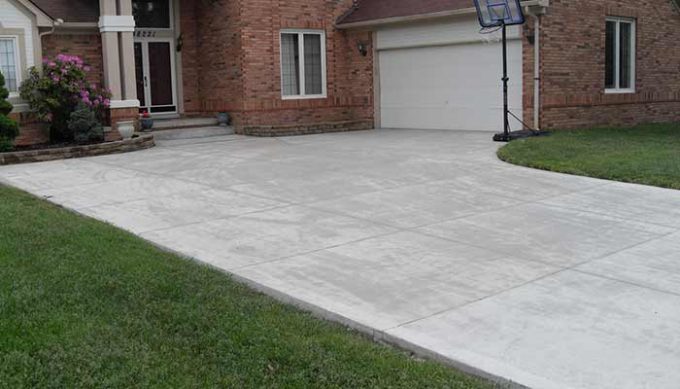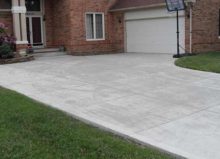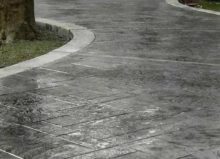Pros and Cons of Sealing Concrete Driveway

Should You Seal Your Concrete Driveway?
Did you know that unsealed concrete driveways begin deteriorating as soon as they dry? Sunlight, extreme temperatures, humidity, rainfall, and even carbonation caused by pollution can cause concrete driveways to rapidly deteriorate. Beyond natural environmental stressors, oil and transmission leakage, vehicle traffic, and salt can all reduce the lifecycle of an unsealed concrete driveway.
While there are definitely advantages to sealing your concrete driveway, there also can be some disadvantages.
The Pros & Cons of Sealing Concrete Driveway Surfaces
As the owner of a home or business, you know that the exterior appearance matters just as much as the interior. And, your driveway definitely has an impact on the exterior appearance. Maintaining driveways is vital to any property owner who wants to increase the value of their residual or commercial properties. Beyond potentially increasing your property value, sealing your concrete driveway also offers the following benefits:
Pros
- Repels Moisture & Humidity: Moisture is one of the leading causes of cracks in concrete driveways. Once cracks appear in driveways, it only gets worse from there.
- Prevents Hard Staining: Cars that stay parked in driveways may leak, and these chemicals can cause hard-to-remove stains.
- Extends Lifecycle of Driveway: This is arguably the most important advantage. A sealed concrete driveway could last for up to 30 years.
- Prevents Color Fading: If you have stained or stamped concrete, sealing it can help extend the longevity of the coloring.
- Blocks Algae, Mold, & Mildew Growth: Certain molds can break down concrete over time. And while mold and mildew are hard to avoid on exterior surfaces, sealing your concrete driveway can inhibit the growth of harmful mold, algae, and mildew.
Additionally, sealing concrete driveways and parking lots is also an environmentally-friendly action that stops harmful oil, vehicle fluids, and other noxious liquids from seeping into the soil and possibly contaminating the local water supply.
Cons
On the other hand, sealing driveways does have its disadvantages. For one, as a DIY project, it can become labor-intensive and time-consuming. It involves much more than just spreading the sealant over concrete. Having a professional take on this task for you can help you save both time and money.
In addition to being difficult as a DIY project, the other disadvantages of concrete sealing include:
- Minor Safety Hazards: They can be slippery when wet and dry. We recommend blending a fine abrasive into the sealer to give your driveway a non-skid surface.
- Not a One-Time Task: Resealing is usually necessary every few years, especially if your driveway is a high-traffic area. However, routine resealing’s pay for themselves in the long run by extending the durability of your concrete driveway.
- Potential Toxicity: Some driveway sealers are toxic to pets. Be sure to research non-toxic sealers that won’t harm pets or other wildlife.
- Wait Time for New Slabs: Applying a sealer to a newly poured concrete driveway before it is completely dry, or cured, can actually make the concrete more vulnerable to damage. Slabs should be at least one month old before they are sealed.
Weighing Out the Pros & Cons
Although concrete driveway sealing should preferably be done by an experienced industry professional, and it requires wait time on newly poured slabs, the overall advantages far outweigh these minor inconveniences.
When you work with a professional, you don’t have to worry about renting equipment, accidentally purchasing the wrong type of sealer, or dealing with the labor involved in the project, and you’re more likely to see a higher quality outcome.
How Often Should You Seal Your Driveway?
As we mentioned earlier, concrete sealing isn’t a one-time job; you’ll have to get your driveway resealed every few years (usually every one to three), but the exact number of years depends on a few factors, including the amount of traffic your driveway usually gets, your climate/weather conditions, and the quality of your sealer. To ensure longevity of your driveway, it’s important that you do invest in this routine maintenance—it will save you money in the long run!
Request Concrete Driveway Sealing Services Today
Do you need help sealing your driveway? Turn to G&G Concrete & Construction. We provide commercial and residential concrete services, including maintenance, repairs, and installations. Don’t hesitate to contact us today with any questions or to request a quote.



